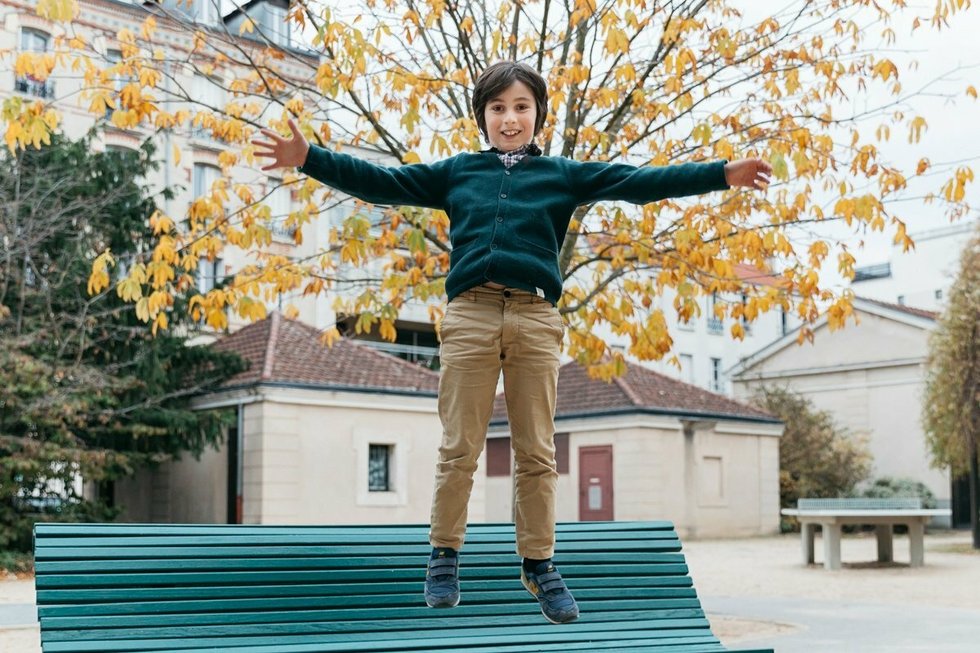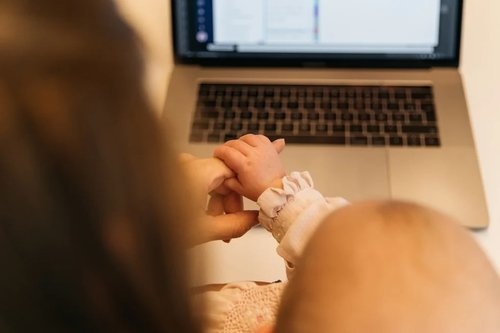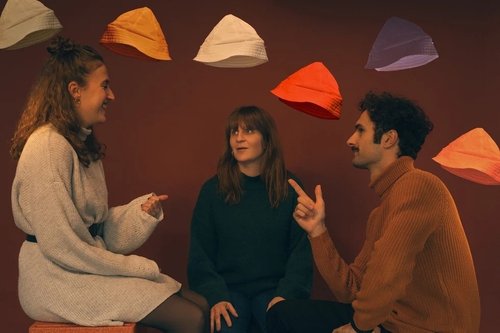The next generation: how children see the future of work
Oct 27, 2020
5 mins


Writer and editor
What did you want to be when you were a child? Did you dream of becoming an inventor, a football player, a teacher, or a vet? Did you imagine yourself as the big boss with your own glass-walled office or working in a zoo perhaps? And did your dreams in any way come true? We talked to children aged from seven to 12 about how they imagine the future of work. Perhaps as adults, we could learn a thing or two from their answers about our approach to work, too.
Kids just want to have fun
First and foremost, work is about having fun. I mean, who would stick to a job if it wasn’t enjoyable? Our young respondents couldn’t understand that concept at all. “Loving your job is important. You wouldn’t want to go to work every day not liking what you do. You’d come home, be really sad, and everyone else would be really sad,” said Emma, 10. “If I wasn’t happy, I’d change my job.”
Work is about being happy, agreed Tom, 11. “Loving your job is a very important part of having a happy life. If you’re a laundry worker and you hate that job, and you want to be a fashion designer, it’s not very good for your well-being. You need to do the thing that’s best for you.”
For seven-year-old Thea, work was invented to keep us entertained. “I want to do a fun job, it’s the most important thing. This is why they have jobs. It kind of gets a bit boring if you’re on your own or minding your children. So that’s why they made work, so you can earn money and have fun.”
Let’s talk money
Who needs a fat salary? None of our young interviewees thought money was important, apart from one wannabe professional footballer. “The most important thing about a job is that you do it properly and try your best. You have to like your job. The money isn’t so important,” said 11-year-old Elle, who wants to be a teacher.
Of course, let’s not discount what money does. “You shouldn’t NOT be earning money,” said Emma. “But if you had this really bad job and got loads of money from it but you were miserable, it’s not worth it. You want to be able to get yourself a new dress or shoes, but it’s more important to like your job and be happy in your job than to earn money.”
Eight-year-old Willow summed it up: “It’s important to have fun and work hard and earn money. Both fun and money are important! People do things like work for magazines and if they didn’t do it, how would the magazines come out? If there were no artists, there’d be no paintings. Some people work for their passion.”
Following their passions
Career aspirations reflected their hobbies and interests. Emma wants to be a riding instructor and Lucy a chef, while Isaac and Tom want to be professional footballers. The most popular job was a teacher, which shows the influence that school has on young lives. Yet nobody chose the same job as their parents. Vet, event manager, architect, designer, artist, farmer, scientist, and working for Nasa all got a mention, with many choices reflecting their personalities. “I would like to be a scientist or an artist, or maybe both,” said Willow. “I would do my experiments and make joke things for kids—pranks and stink bombs—and sometimes, if we’re low on medicine, I would make more medicine.”
The coronavirus influence
The pandemic certainly influenced their answers. All the children thought Covid-19 would be well and truly over by the time they were in the workplace, but there were fears of future viruses. “We need more doctors as there might be another sickness and we need to prepare for it, and more scientists to find out more about medicine just in case,” said Thea.
Work from home? No thanks
The majority of the children interviewed saw their parents jolted into remote working during the lockdown. Their view? It doesn’t look like much fun. “It’s affected the way Mummy and Daddy work because they’re home more and they’re not in the office,” said Tom. “They have to go on loads of work calls. I think it’s more stressful than going to the office.”
About half the interviewees want to work from home some of the time, but nobody wants to be 100% remote. Many of their preferred jobs are outdoors—“It’s nicer outside, in the fresh air,” said Emma—while having a cool office is a big deal for the future teachers and architects.
Dressed for success
There’s a message for all the parents working from home in their tatty tracksuits: the next generation of professionals will be smartly dressed. “I would wear a very special teaching uniform. It is navy dark blue and it is very smart,” said Sophie. Meanwhile, Elle saw her teaching outfit as “a pencil skirt, a turtleneck jumper, and tights”. Future architect Jack favored a suit while Oisin saw himself in “a polo shirt with a tie and some nice trousers” working for Nasa as ground control in the space office.
It’s all about teamwork
Their distinct lack of interest in remote working is part of a desire to be part of a team. Every interviewee wanted to work with others. “I’d like to work as a team, to make friends with more people. We can help each other out when someone doesn’t understand,” said Elle.
This is proof indeed that we are sociable beings. “If you’re not in a team you’d be lonely and if you’re lonely you’d be scared and I don’t like being scared,” said Sophie.
Technology and the future
The next generation already knows how to work a smartphone, YouTube, and Alexa—their brains are ready to embrace the next technological advances.
Robots, it seems, will be doing a lot more jobs, from building cars to manufacturing food. However, they won’t take over the working world, according to Emma. “There will be a load of advanced technology, like cars will drive themselves,” she said. “Robots will be controlled by people still in factories and stuff. Even [with], like, a phone, technology can go wrong. And humans will always need to fix it.”
Elle believes there might be fewer teachers as technology advances. “Say, in 2040, teachers might not be needed so much because there will be more technology to learn from. You could learn from a computer at home.”
Others see technology as lending them a hand, especially the future teachers. “I think the kids will have laptops too and they might do a bit of study or a quiz on them. If we ever want to go somewhere and it’s too far we can use virtual reality. We can do our school trip to the Amazon, [but] we will actually be there on our virtual reality headsets,” she said.
Thea thought robot hands could help her to tidy up. “There might be robotic tables with arms and the teacher says, ‘Children, can you please tidy away your pencil cases,’ and the arms on the tables would help,” she said.
Nobody wanted to work on a computer all day, but they did want their own laptops. “There won’t be old-fashioned computers,” said Sophie.
Homebirds
We will work further afield too–in the skies above and the oceans below. All children, except one, thought that more people would work in space. “They will go there for longer periods and study what’s on the planets and try to find signs of inhabitants,” said Tom. Jack thought we might even live on Mars! Plus, there was talk of people working from submarines.
Their adventurous, independent teenage years have yet to begin, so most of the children want to stay local. Although they want to travel for leisure, and maybe a bit for work, they see themselves working close to home, whether that is in the country or the city. “Near my mum,” Elle said.
Who knows how the world of work will evolve, judging from what the past eight months have brought us. Whatever it brings, let’s hope this fun-loving bunch of kids sticks with the idea that doing a job that makes them happy is one of the most important parts of life.
Photo: Welcome to the Jungle
Follow Welcome to the Jungle on Facebook, LinkedIn, and Instagram, and subscribe to our newsletter to get our latest articles every day!

More inspiration: Inspiration for workers

From hobby to side hustle: 10 steps to turn your passion into a career in 2025
Have you been waiting for the right moment to turn what you love into a paid gig? 2025 is your time!
Dec 18, 2024

Patience, balance, and multitasking: How parenthood shaped my career
Parenthood changes everything—including your career. These working parents share exactly how.
Dec 11, 2024

The traits of a great boss (and how they make your work life better)
What makes a great boss? Effective leaders do more than manage tasks—they create a workplace where people feel supported, encouraged, and inspired.
Nov 13, 2024

Leading without limits: How to shine as a leader, title or no title
Lab expert Ginny Clarke explores how being a leader isn't just reserved for execs ...
Apr 09, 2024

How our burnt-out society can finally get some rest
Alex Soojung-Kim Pang unveils transformative strategies for slowing down our fast-paced lives.
Mar 19, 2024
The newsletter that does the job
Want to keep up with the latest articles? Twice a week you can receive stories, jobs, and tips in your inbox.

Looking for your next job?
Over 200,000 people have found a job with Welcome to the Jungle.
Explore jobs